FY027: Self Development and Responsibility Presentation
VerifiedAdded on 2023/01/10
|11
|1201
|83
Presentation
AI Summary
This presentation delves into the multifaceted concept of success, particularly within the context of studentship. It begins by defining success as the achievement of personal goals and satisfaction, emphasizing its subjective nature. The main body of the presentation outlines key elements for attaining success, including defining clear goals to maintain focus and energy, committing to academic studies through active participation and a desire for knowledge, developing effective communication skills for expressing ideas and engaging in meaningful conversations, and honing problem-solving abilities to critically analyze and resolve challenges. The presentation underscores the importance of these elements for personal and professional development. The conclusion reiterates the broad nature of success and summarizes the measures discussed, such as setting objectives, active participation, academic commitment, and soft skill development, to help students achieve their goals.
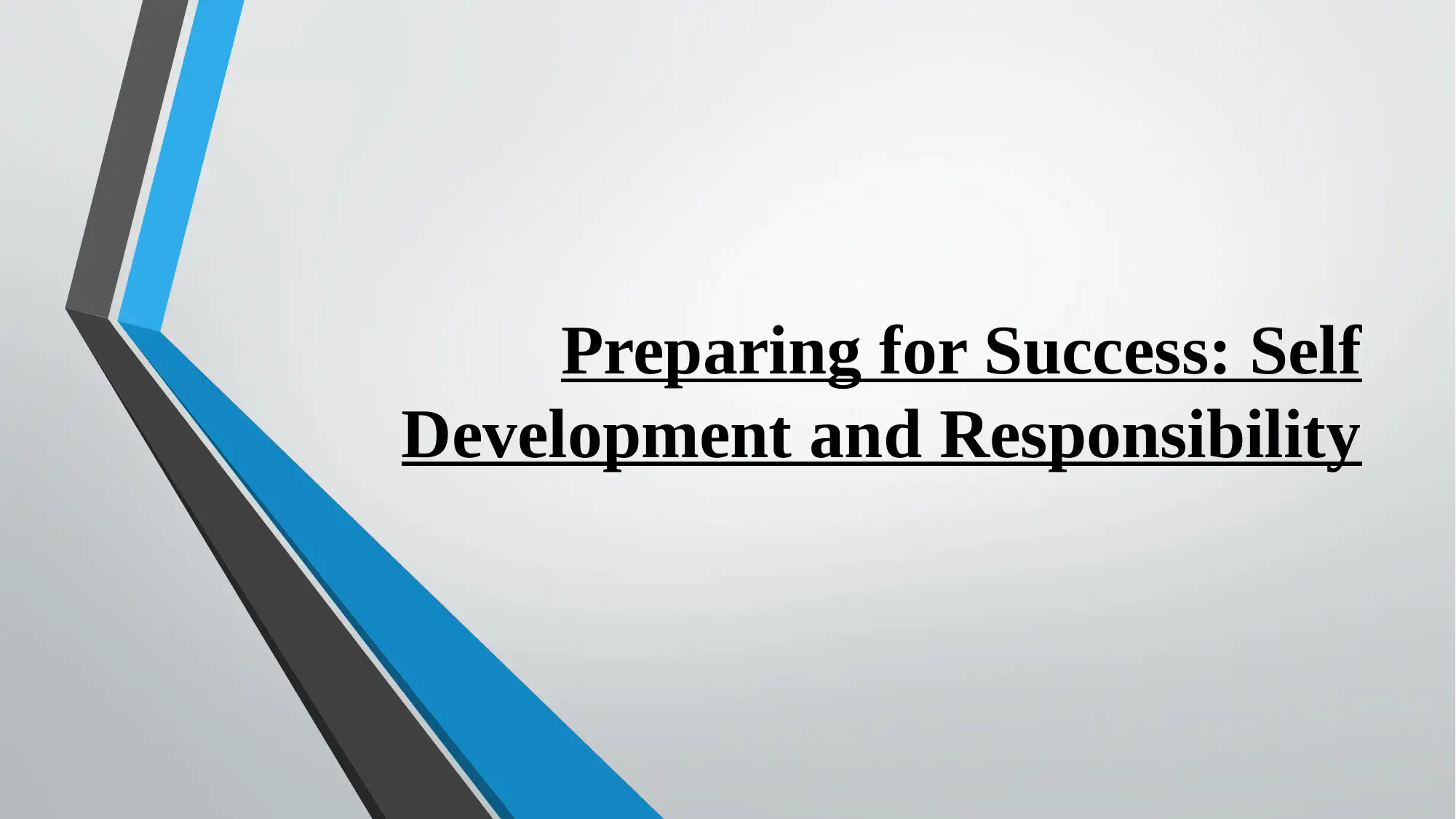
Preparing for Success: Self
Development and Responsibility
Development and Responsibility
Paraphrase This Document
Need a fresh take? Get an instant paraphrase of this document with our AI Paraphraser
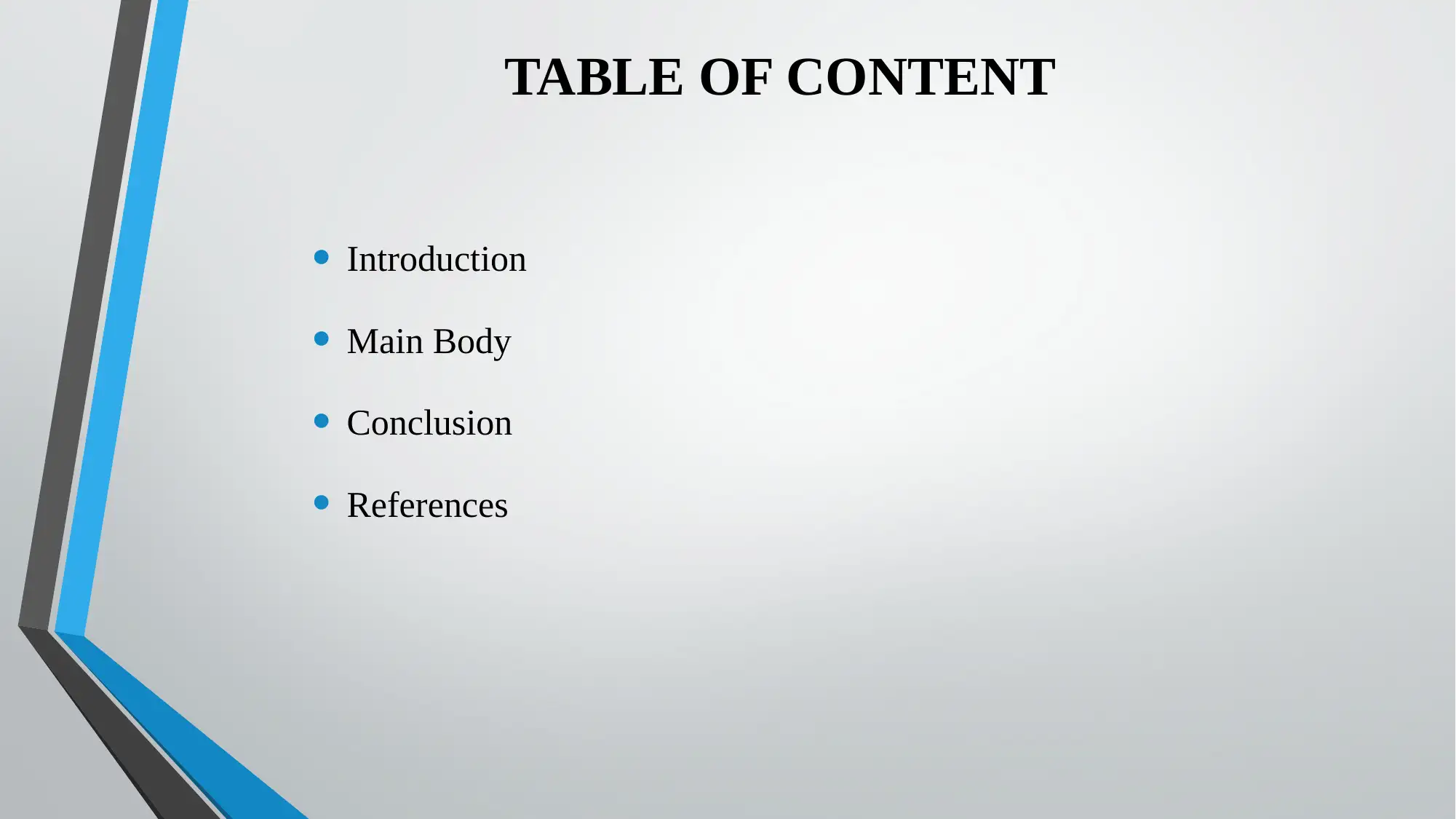
TABLE OF CONTENT
• Introduction
• Main Body
• Conclusion
• References
• Introduction
• Main Body
• Conclusion
• References
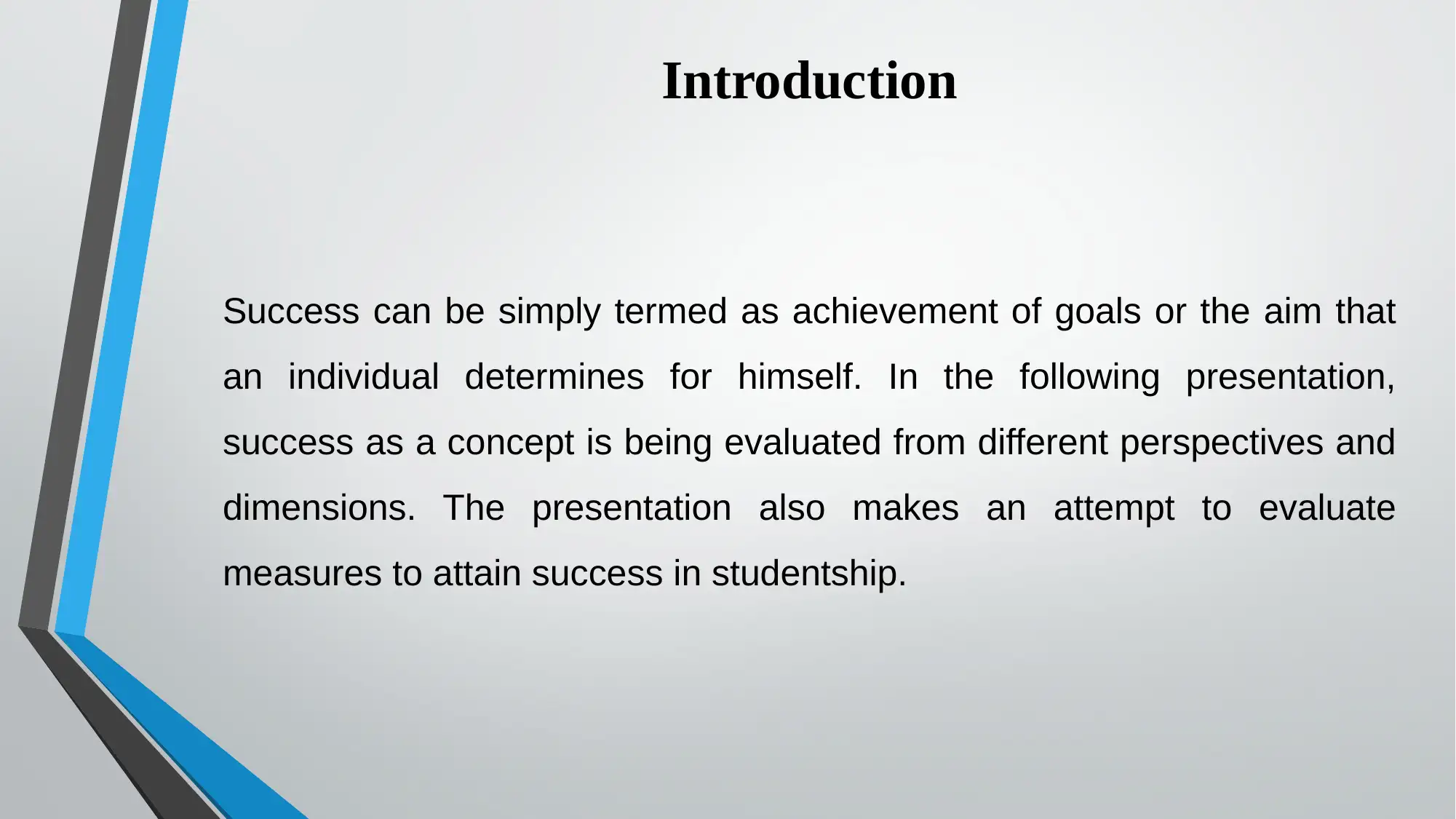
Introduction
Success can be simply termed as achievement of goals or the aim that
an individual determines for himself. In the following presentation,
success as a concept is being evaluated from different perspectives and
dimensions. The presentation also makes an attempt to evaluate
measures to attain success in studentship.
Success can be simply termed as achievement of goals or the aim that
an individual determines for himself. In the following presentation,
success as a concept is being evaluated from different perspectives and
dimensions. The presentation also makes an attempt to evaluate
measures to attain success in studentship.
⊘ This is a preview!⊘
Do you want full access?
Subscribe today to unlock all pages.

Trusted by 1+ million students worldwide
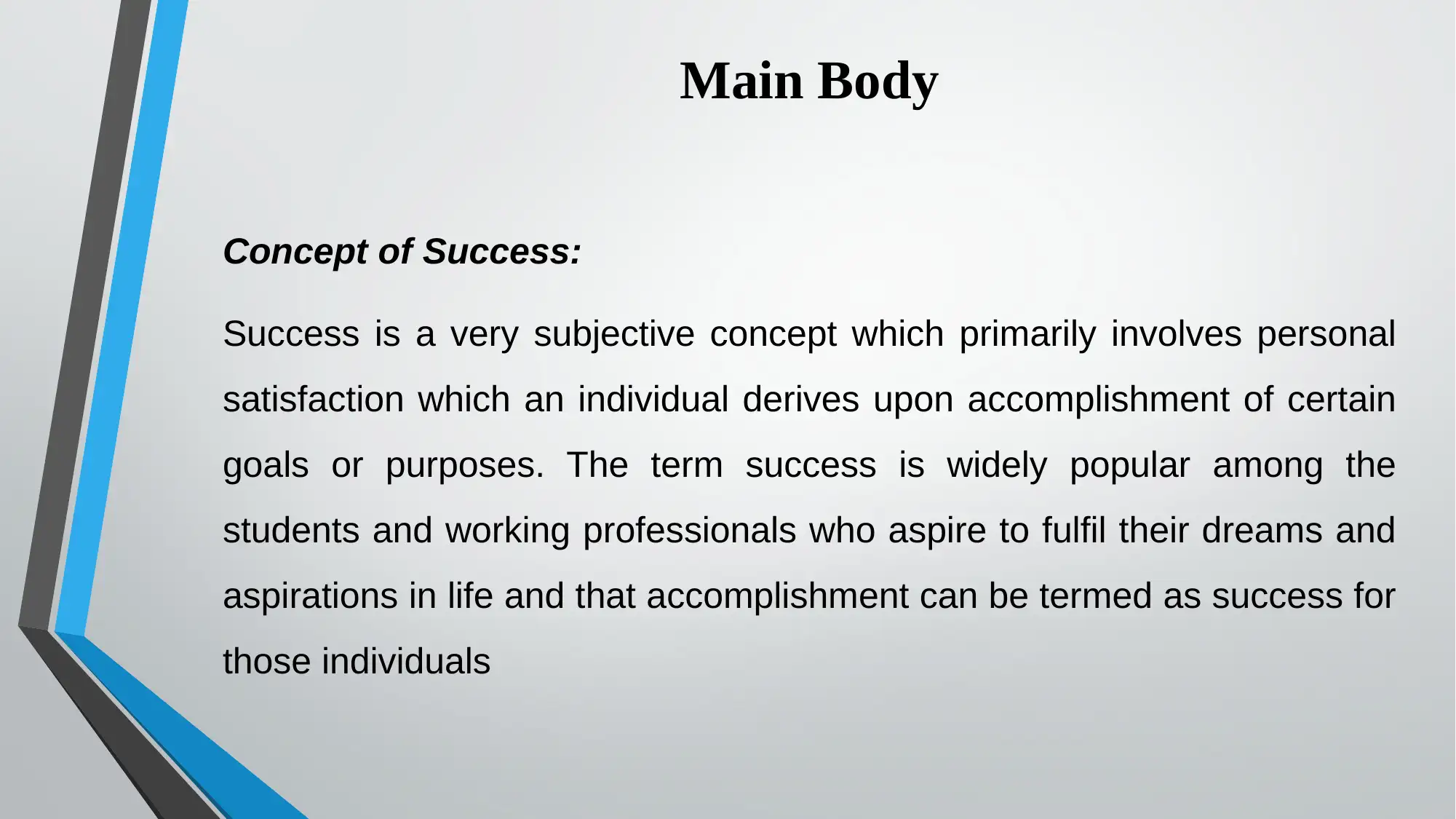
Main Body
Concept of Success:
Success is a very subjective concept which primarily involves personal
satisfaction which an individual derives upon accomplishment of certain
goals or purposes. The term success is widely popular among the
students and working professionals who aspire to fulfil their dreams and
aspirations in life and that accomplishment can be termed as success for
those individuals
Concept of Success:
Success is a very subjective concept which primarily involves personal
satisfaction which an individual derives upon accomplishment of certain
goals or purposes. The term success is widely popular among the
students and working professionals who aspire to fulfil their dreams and
aspirations in life and that accomplishment can be termed as success for
those individuals
Paraphrase This Document
Need a fresh take? Get an instant paraphrase of this document with our AI Paraphraser
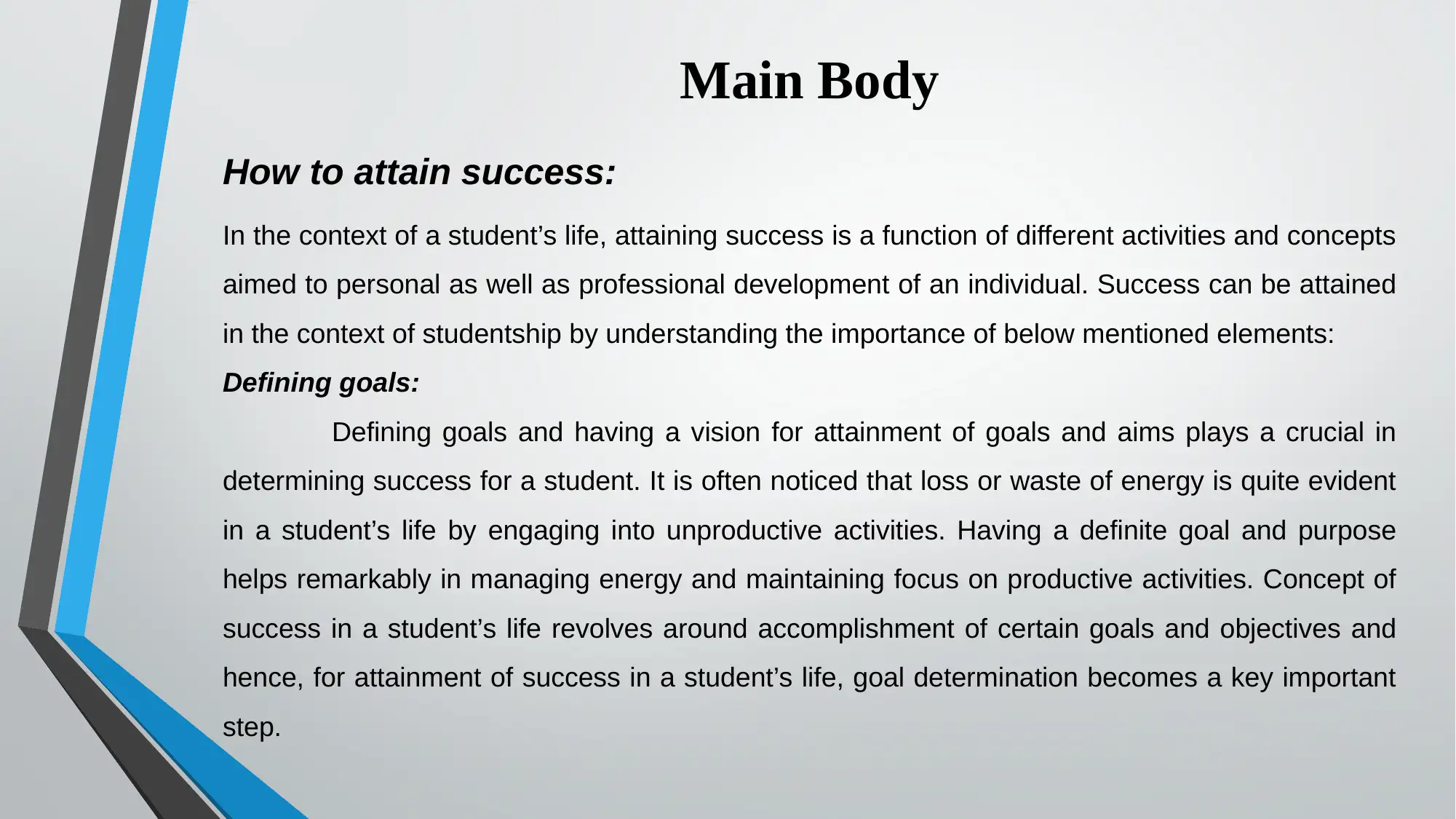
Main Body
How to attain success:
In the context of a student’s life, attaining success is a function of different activities and concepts
aimed to personal as well as professional development of an individual. Success can be attained
in the context of studentship by understanding the importance of below mentioned elements:
Defining goals:
Defining goals and having a vision for attainment of goals and aims plays a crucial in
determining success for a student. It is often noticed that loss or waste of energy is quite evident
in a student’s life by engaging into unproductive activities. Having a definite goal and purpose
helps remarkably in managing energy and maintaining focus on productive activities. Concept of
success in a student’s life revolves around accomplishment of certain goals and objectives and
hence, for attainment of success in a student’s life, goal determination becomes a key important
step.
How to attain success:
In the context of a student’s life, attaining success is a function of different activities and concepts
aimed to personal as well as professional development of an individual. Success can be attained
in the context of studentship by understanding the importance of below mentioned elements:
Defining goals:
Defining goals and having a vision for attainment of goals and aims plays a crucial in
determining success for a student. It is often noticed that loss or waste of energy is quite evident
in a student’s life by engaging into unproductive activities. Having a definite goal and purpose
helps remarkably in managing energy and maintaining focus on productive activities. Concept of
success in a student’s life revolves around accomplishment of certain goals and objectives and
hence, for attainment of success in a student’s life, goal determination becomes a key important
step.
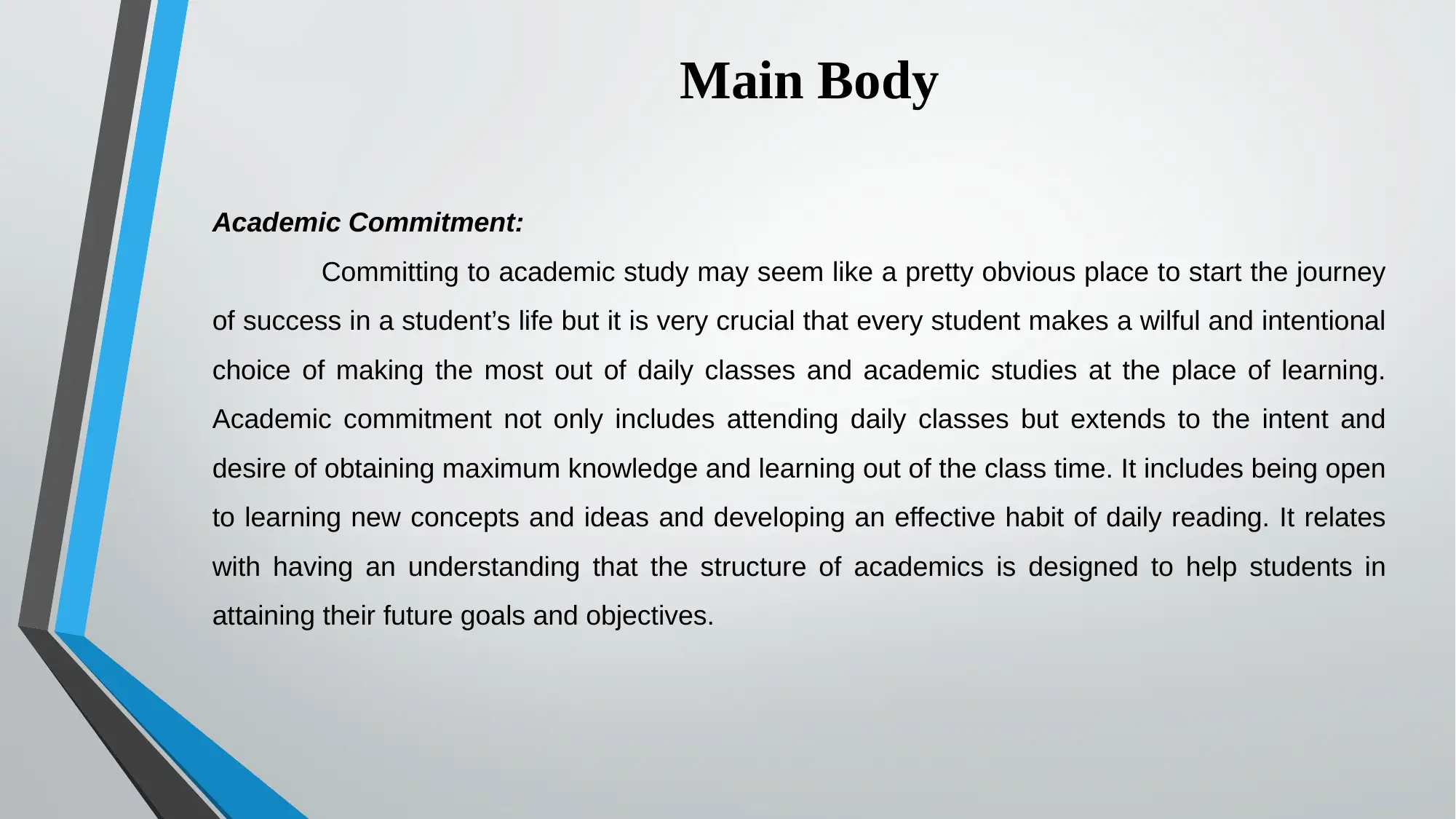
Main Body
Academic Commitment:
Committing to academic study may seem like a pretty obvious place to start the journey
of success in a student’s life but it is very crucial that every student makes a wilful and intentional
choice of making the most out of daily classes and academic studies at the place of learning.
Academic commitment not only includes attending daily classes but extends to the intent and
desire of obtaining maximum knowledge and learning out of the class time. It includes being open
to learning new concepts and ideas and developing an effective habit of daily reading. It relates
with having an understanding that the structure of academics is designed to help students in
attaining their future goals and objectives.
Academic Commitment:
Committing to academic study may seem like a pretty obvious place to start the journey
of success in a student’s life but it is very crucial that every student makes a wilful and intentional
choice of making the most out of daily classes and academic studies at the place of learning.
Academic commitment not only includes attending daily classes but extends to the intent and
desire of obtaining maximum knowledge and learning out of the class time. It includes being open
to learning new concepts and ideas and developing an effective habit of daily reading. It relates
with having an understanding that the structure of academics is designed to help students in
attaining their future goals and objectives.
⊘ This is a preview!⊘
Do you want full access?
Subscribe today to unlock all pages.

Trusted by 1+ million students worldwide
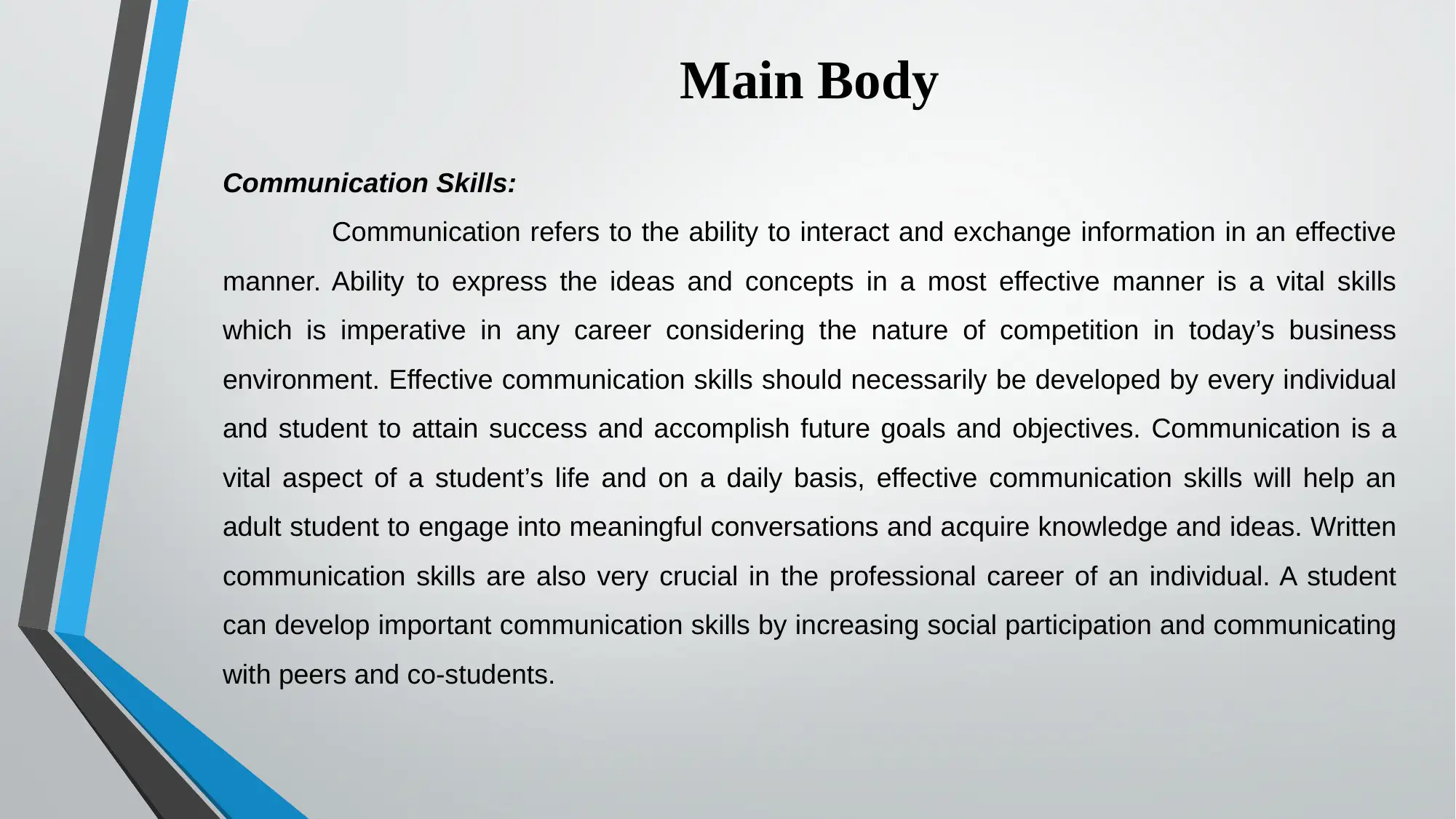
Main Body
Communication Skills:
Communication refers to the ability to interact and exchange information in an effective
manner. Ability to express the ideas and concepts in a most effective manner is a vital skills
which is imperative in any career considering the nature of competition in today’s business
environment. Effective communication skills should necessarily be developed by every individual
and student to attain success and accomplish future goals and objectives. Communication is a
vital aspect of a student’s life and on a daily basis, effective communication skills will help an
adult student to engage into meaningful conversations and acquire knowledge and ideas. Written
communication skills are also very crucial in the professional career of an individual. A student
can develop important communication skills by increasing social participation and communicating
with peers and co-students.
Communication Skills:
Communication refers to the ability to interact and exchange information in an effective
manner. Ability to express the ideas and concepts in a most effective manner is a vital skills
which is imperative in any career considering the nature of competition in today’s business
environment. Effective communication skills should necessarily be developed by every individual
and student to attain success and accomplish future goals and objectives. Communication is a
vital aspect of a student’s life and on a daily basis, effective communication skills will help an
adult student to engage into meaningful conversations and acquire knowledge and ideas. Written
communication skills are also very crucial in the professional career of an individual. A student
can develop important communication skills by increasing social participation and communicating
with peers and co-students.
Paraphrase This Document
Need a fresh take? Get an instant paraphrase of this document with our AI Paraphraser
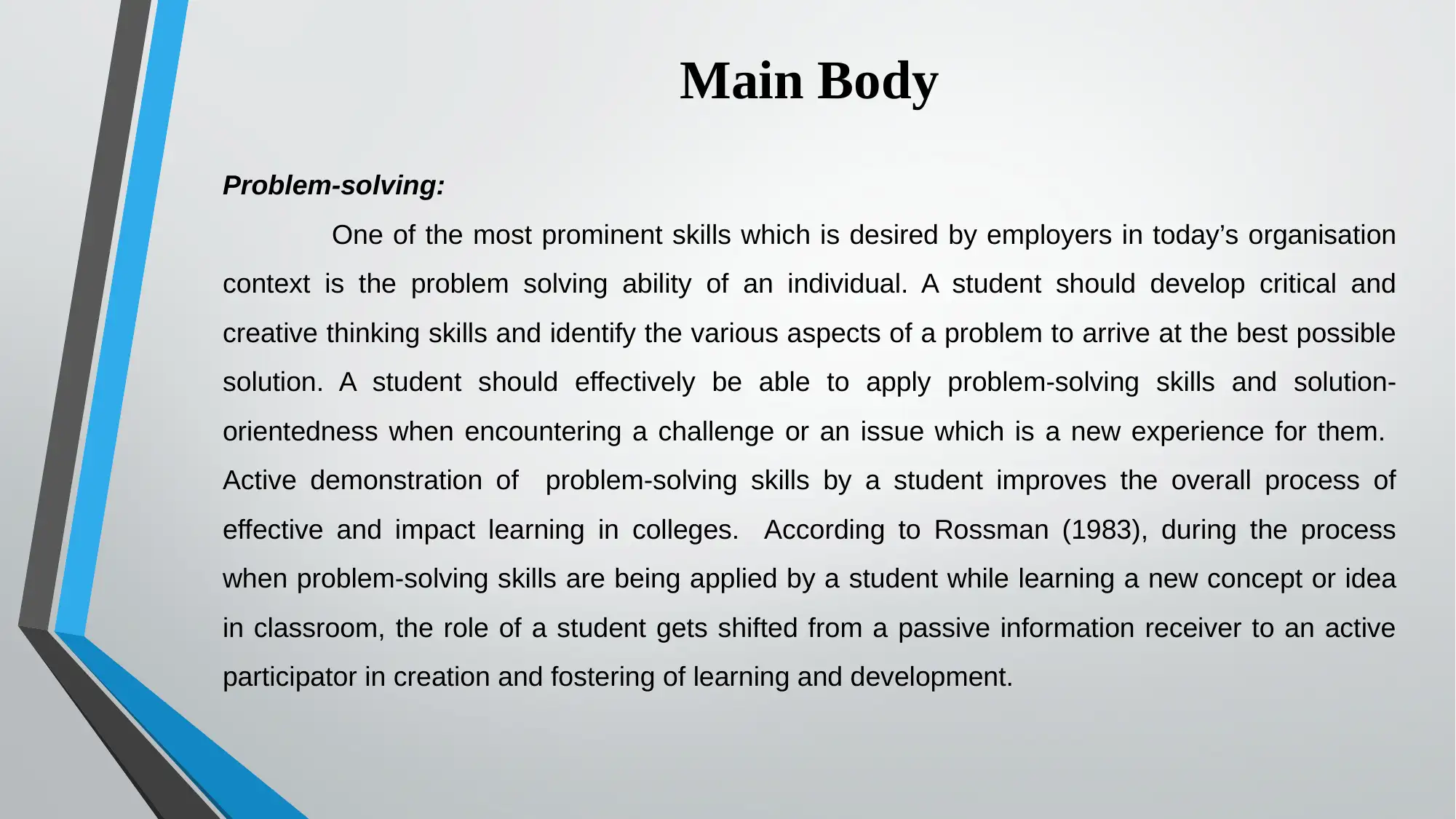
Main Body
Problem-solving:
One of the most prominent skills which is desired by employers in today’s organisation
context is the problem solving ability of an individual. A student should develop critical and
creative thinking skills and identify the various aspects of a problem to arrive at the best possible
solution. A student should effectively be able to apply problem-solving skills and solution-
orientedness when encountering a challenge or an issue which is a new experience for them.
Active demonstration of problem-solving skills by a student improves the overall process of
effective and impact learning in colleges. According to Rossman (1983), during the process
when problem-solving skills are being applied by a student while learning a new concept or idea
in classroom, the role of a student gets shifted from a passive information receiver to an active
participator in creation and fostering of learning and development.
Problem-solving:
One of the most prominent skills which is desired by employers in today’s organisation
context is the problem solving ability of an individual. A student should develop critical and
creative thinking skills and identify the various aspects of a problem to arrive at the best possible
solution. A student should effectively be able to apply problem-solving skills and solution-
orientedness when encountering a challenge or an issue which is a new experience for them.
Active demonstration of problem-solving skills by a student improves the overall process of
effective and impact learning in colleges. According to Rossman (1983), during the process
when problem-solving skills are being applied by a student while learning a new concept or idea
in classroom, the role of a student gets shifted from a passive information receiver to an active
participator in creation and fostering of learning and development.
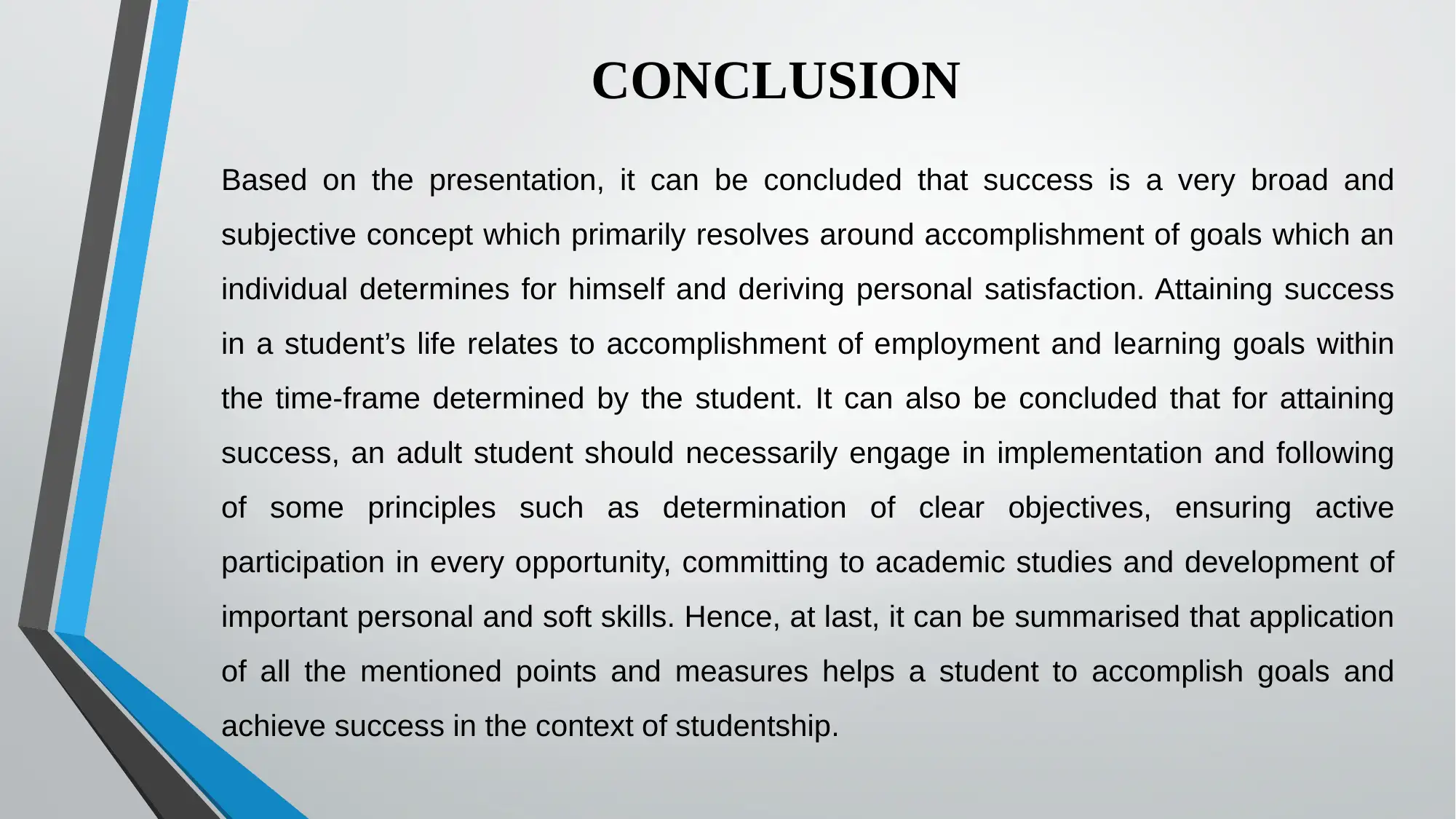
CONCLUSION
Based on the presentation, it can be concluded that success is a very broad and
subjective concept which primarily resolves around accomplishment of goals which an
individual determines for himself and deriving personal satisfaction. Attaining success
in a student’s life relates to accomplishment of employment and learning goals within
the time-frame determined by the student. It can also be concluded that for attaining
success, an adult student should necessarily engage in implementation and following
of some principles such as determination of clear objectives, ensuring active
participation in every opportunity, committing to academic studies and development of
important personal and soft skills. Hence, at last, it can be summarised that application
of all the mentioned points and measures helps a student to accomplish goals and
achieve success in the context of studentship.
Based on the presentation, it can be concluded that success is a very broad and
subjective concept which primarily resolves around accomplishment of goals which an
individual determines for himself and deriving personal satisfaction. Attaining success
in a student’s life relates to accomplishment of employment and learning goals within
the time-frame determined by the student. It can also be concluded that for attaining
success, an adult student should necessarily engage in implementation and following
of some principles such as determination of clear objectives, ensuring active
participation in every opportunity, committing to academic studies and development of
important personal and soft skills. Hence, at last, it can be summarised that application
of all the mentioned points and measures helps a student to accomplish goals and
achieve success in the context of studentship.
⊘ This is a preview!⊘
Do you want full access?
Subscribe today to unlock all pages.

Trusted by 1+ million students worldwide
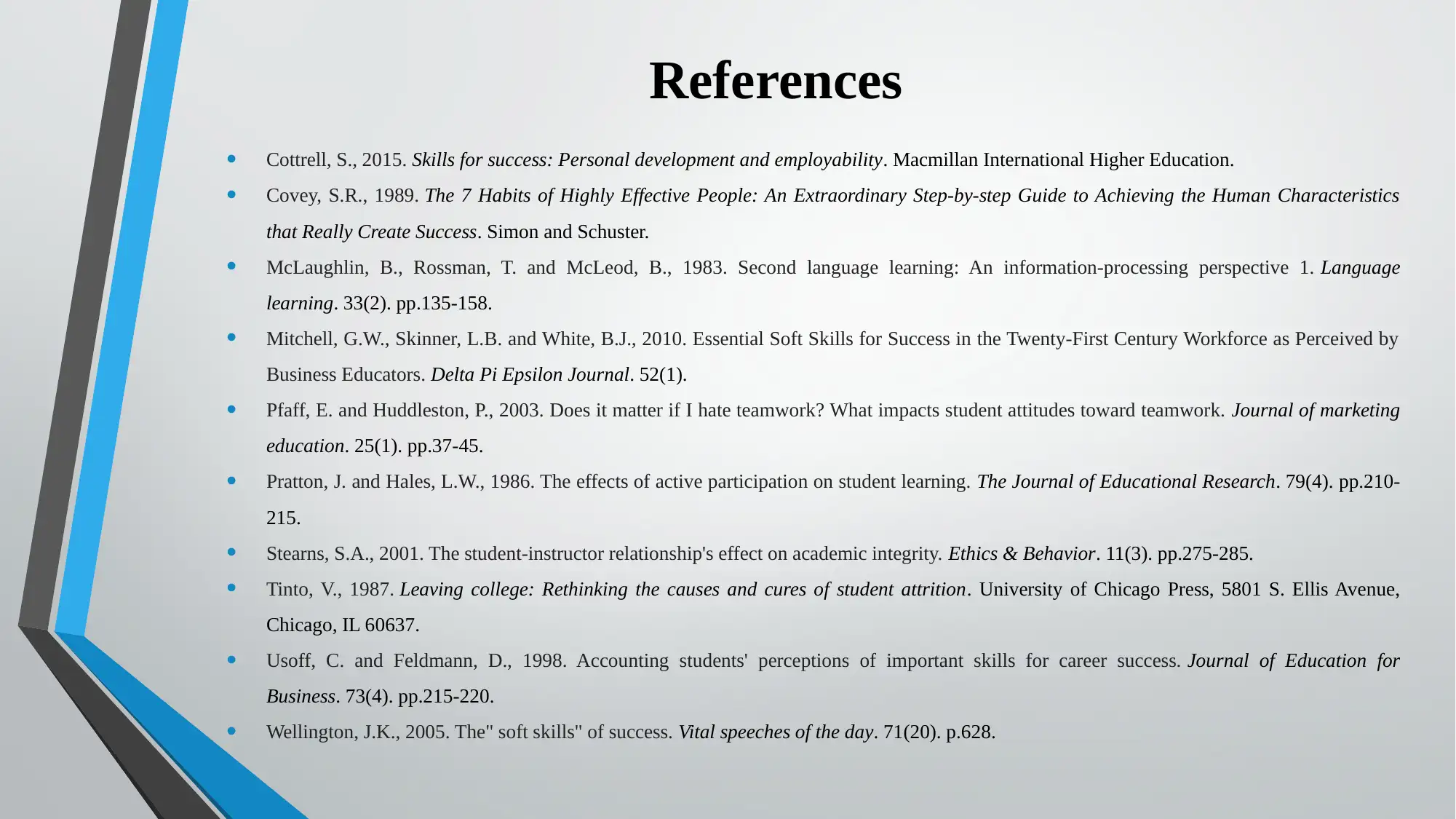
References
• Cottrell, S., 2015. Skills for success: Personal development and employability. Macmillan International Higher Education.
• Covey, S.R., 1989. The 7 Habits of Highly Effective People: An Extraordinary Step-by-step Guide to Achieving the Human Characteristics
that Really Create Success. Simon and Schuster.
• McLaughlin, B., Rossman, T. and McLeod, B., 1983. Second language learning: An information‐processing perspective 1. Language
learning. 33(2). pp.135-158.
• Mitchell, G.W., Skinner, L.B. and White, B.J., 2010. Essential Soft Skills for Success in the Twenty-First Century Workforce as Perceived by
Business Educators. Delta Pi Epsilon Journal. 52(1).
• Pfaff, E. and Huddleston, P., 2003. Does it matter if I hate teamwork? What impacts student attitudes toward teamwork. Journal of marketing
education. 25(1). pp.37-45.
• Pratton, J. and Hales, L.W., 1986. The effects of active participation on student learning. The Journal of Educational Research. 79(4). pp.210-
215.
• Stearns, S.A., 2001. The student-instructor relationship's effect on academic integrity. Ethics & Behavior. 11(3). pp.275-285.
• Tinto, V., 1987. Leaving college: Rethinking the causes and cures of student attrition. University of Chicago Press, 5801 S. Ellis Avenue,
Chicago, IL 60637.
• Usoff, C. and Feldmann, D., 1998. Accounting students' perceptions of important skills for career success. Journal of Education for
Business. 73(4). pp.215-220.
• Wellington, J.K., 2005. The" soft skills" of success. Vital speeches of the day. 71(20). p.628.
• Cottrell, S., 2015. Skills for success: Personal development and employability. Macmillan International Higher Education.
• Covey, S.R., 1989. The 7 Habits of Highly Effective People: An Extraordinary Step-by-step Guide to Achieving the Human Characteristics
that Really Create Success. Simon and Schuster.
• McLaughlin, B., Rossman, T. and McLeod, B., 1983. Second language learning: An information‐processing perspective 1. Language
learning. 33(2). pp.135-158.
• Mitchell, G.W., Skinner, L.B. and White, B.J., 2010. Essential Soft Skills for Success in the Twenty-First Century Workforce as Perceived by
Business Educators. Delta Pi Epsilon Journal. 52(1).
• Pfaff, E. and Huddleston, P., 2003. Does it matter if I hate teamwork? What impacts student attitudes toward teamwork. Journal of marketing
education. 25(1). pp.37-45.
• Pratton, J. and Hales, L.W., 1986. The effects of active participation on student learning. The Journal of Educational Research. 79(4). pp.210-
215.
• Stearns, S.A., 2001. The student-instructor relationship's effect on academic integrity. Ethics & Behavior. 11(3). pp.275-285.
• Tinto, V., 1987. Leaving college: Rethinking the causes and cures of student attrition. University of Chicago Press, 5801 S. Ellis Avenue,
Chicago, IL 60637.
• Usoff, C. and Feldmann, D., 1998. Accounting students' perceptions of important skills for career success. Journal of Education for
Business. 73(4). pp.215-220.
• Wellington, J.K., 2005. The" soft skills" of success. Vital speeches of the day. 71(20). p.628.
Paraphrase This Document
Need a fresh take? Get an instant paraphrase of this document with our AI Paraphraser

THANK YOU
1 out of 11
Related Documents
Your All-in-One AI-Powered Toolkit for Academic Success.
+13062052269
info@desklib.com
Available 24*7 on WhatsApp / Email
![[object Object]](/_next/static/media/star-bottom.7253800d.svg)
Unlock your academic potential
Copyright © 2020–2026 A2Z Services. All Rights Reserved. Developed and managed by ZUCOL.




